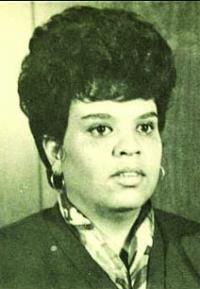February 24, 2021

Doris Bunte, who died on Feb. 15 at age 87, was a wonderful woman, a magnificent mentor, and a prodigious politician. The word that describes her best is “Mother.” Doris was that, yes, and also a mother, a grandmother, and a great-grandmother. She was also a mother to many more than her biological offspring.
As the first African-American woman elected to the Massachusetts Legislature, she was a political trailblazer who was involved in politics for all of the right reasons: She wanted to use political action to improve the lives and the living conditions of Black people in Boston’s neighborhoods whose needs were, sometimes, overwhelming. She wanted to give Black and Brown people a voice, and a seat, at the tables where political decisions were made at the local, state and federal levels – it was a voice that had rarely been heard in those settings.
When newly elected Boston Mayor Raymond L. Flynn appointed her to serve as administrator of The Boston Housing Authority (BHA) in 1984, she became the first former resident of public housing to head a major public housing agency in the United States. The BHA, at that time, was the fourth-largest provider of public housing in the nation.
She had gained local prominence after her successful public dispute with then-Mayor Kevin H. White, which helped launch her first successful campaign for the Legislature, representing Roxbury and parts of Dorchester. Doris won six more elections, serving for a total of 14 years. While on Beacon Hill, she was a founding member and chair of the Legislative Black Caucus, working in concert with State Representatives Mel King, Saundra Graham, Royal Bolling Jr., Raymond Jordan, Mary Goode, Robert Fortes, and Thomas Lopes, and State Senators Royal Bolling Sr., and Bill Owens.
As a Black state representative, Doris soon found that Black and Brown citizens from all neighborhoods of Boston and other cities and towns within the Commonwealth would reach out to her and the other Black politicians on Beacon Hill, even though they didn’t live in her legislative district. She and the Caucus worked closely with Governors Frank Sargent and Michael Dukakis to address the basic needs and the political aspirations of Black people in Massachusetts.
Hers was an adaptive and effective leadership method that made her transition to the BHA smooth and natural. Her grace and empathy for others defined her.
She faced two momentous challenges as the leader of the BHA. The first was compliance with a federal court order to desegregate public housing in Boston neighborhoods, particularly in South Boston, Charlestown, East Boston, and the North End. That order resulted from a successful federal lawsuit filed by the Boston chapter of The NAACP, a case led by attorneys Dianne Wilkerson and Barbara Arnwine. Secondly, she had to respond to the desperate need to rehabilitate and re-develop thousands of public housing units city-wide – some of which had been boarded-up and unusable for years. She often stated her belief that “poverty is not the result of a flaw in character.”
Major media covered the desegregation effort closely because many thought that it was destined to become a chaotic and violent clash, like the busing years. But Mayor Flynn and Administrator Bunte worked hard with public housing residents, city, state, and federal political leaders, the Boston Police Department, and the media to ensure that there were no major incidents.
In the redevelopment effort, Doris lobbied vigorously with the US Department of Housing and Urban Development (HUD) and with the Commonwealth’s Executive Office of Communities and Development (EOCD) for funding to re-develop and re-design public housing developments that would give residents more attractive places to live and a greater sense of “ownership” in their neighborhoods.
During her tenure as BHA Administrator, Doris Bunte directed more than $300 million for infrastructure improvements in BHA housing.
She was an inspirational member of the National Association of Housing and Redevelopment Organizations (NAHRO) and a founder of the Alliance of Black Directors of Public Housing Agencies nationally. The housing development for elderly residents in the Egleston Square area bears her name.
Doris always took the time to encourage, teach, and serve as a nurturer to individuals from all backgrounds, ethnicities, and races. A native New Yorker who grew up on the Lower East Side of Manhattan, she possessed intelligence, toughness, persistence, determination, and a fearlessness that made her one of the most effective political leaders that Boston and the Commonwealth have ever seen. Her legacy will serve as an inspiration for generations to come, and we will not see her likes again.
Bill Wright is the former director of communications for the Boston Housing Authority. Barry Lawton of Dorchester served in several positions in state government from 1978 to 2004.



